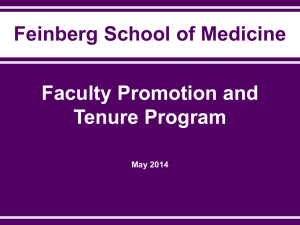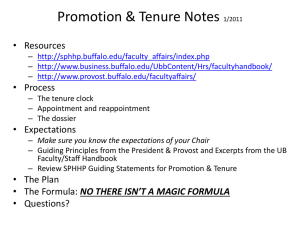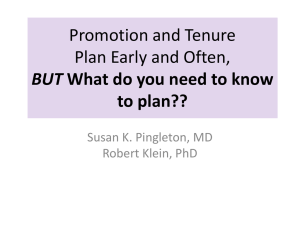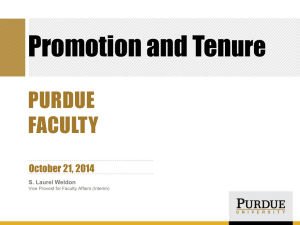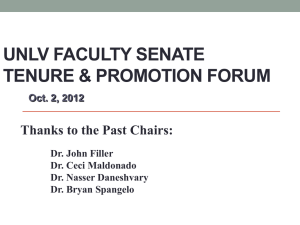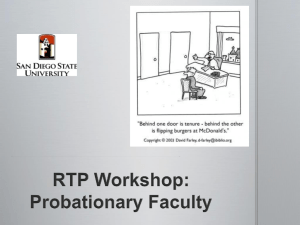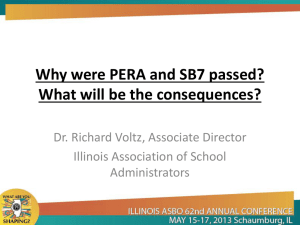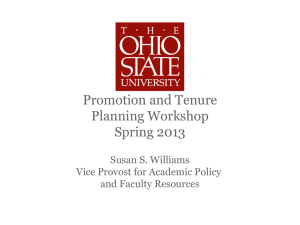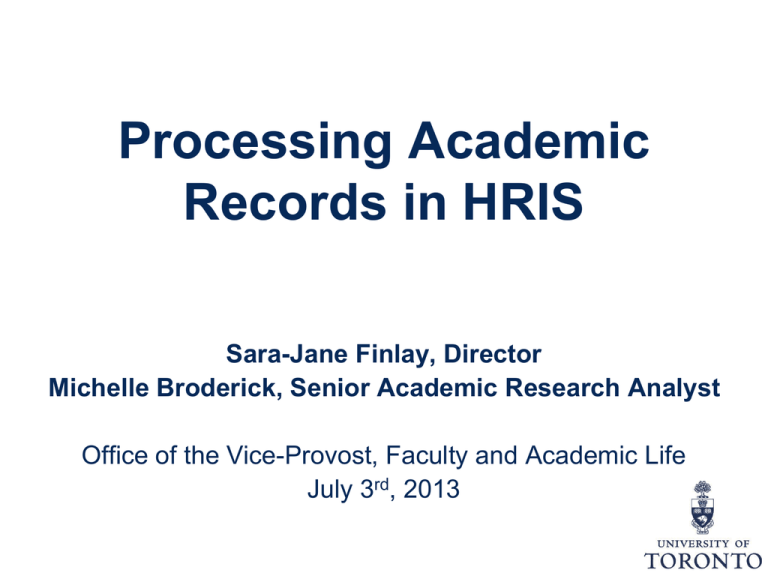
Processing Academic
Records in HRIS
Sara-Jane Finlay, Director
Michelle Broderick, Senior Academic Research Analyst
Office of the Vice-Provost, Faculty and Academic Life
July 3rd, 2013
Topics for Discussion
Why is accuracy important?
Understanding Academic Rank
Academic Administrators
Research and Study Leaves
Common Errors
Why is accuracy important?
Internal analyses on salaries, education, faculty
counts, etc. for the President, Provost, Vice-Provost
Faculty and Academic Life and Vice President
Human Resources and Equity
What do you mean you
can't tell me how many
tenure-stream faculty
we have?
Impact of Errors/Incomplete Info
Verification for faculty HR matters requiring Provostial
approval:
• Research & study leaves
• Tenure & promotion,
• Retirement & emeritus titles
• Grant eligibility (e.g. for status only and adjunct
faculty)
• SGS status
Identification of cohorts for workshops and professional
development programs (for new and mid-career faculty,
academic administrators)
Internal requests for data on academics from UTFA
Impact of Errors/Incomplete Info
External reporting on academic data:• National & Provincial Governments and Lobby
Groups -- AUCC & COU -- (eg. Statistics Canada
FT Faculty Salary Survey)
• National & International Data Exchanges (U15DE
& AAUDE) – Benchmarks (eg. Performance
Indicators for Governance)
Academic Rank:
Tenured/Tenure Stream
Academic Rank:
Tenured/Tenure Stream
Ranks: Assistant Professor (Conditional)
Assistant Professor
Associate Professor (without Tenure)
Associate Professor (with Tenure)
Professor
Policy and Procedures on Academic Appointments
Memorandum of Agreement between the University
of Toronto and the University of Toronto Faculty
Association
Assistant Professor (Conditional)
Assistant Professor (Conditional) is entry
level of tenure stream for a faculty member
who has not yet attained a PhD (or
equivalent).
Contract of 1 year usually
Successful completion of doctoral program/
professional work becomes eligible for
appointment at rank of Assistant Professor.
No more than six years.
Assistant Professor
Three year contract
Performance review – ‘Third Year Review’ – no
earlier than 1st May of 2nd year of contract.
Has the appointee's performance been sufficiently
satisfactory for a second probationary appointment to be
recommended?
If reappointment is recommended, what counseling
should be given to the appointee to assist him or her to
improve areas of weakness and maintain areas of
strength?
Successful outcome – two year renewal, tenure
review in terminal year.
Assistant Professor
Tenure: Tenure, as understood herein, is the holding by a member of the
professorial staff of the University of a continuing full-time
appointment which the University has relinquished the freedom to
terminate before the normal age of retirement except for cause and
under the conditions specified in Sections 27 and 28 below.
Tenure provides a necessary safeguard for free enquiry and
discussion, the exercise of critical capacities, honest judgment, and
independent criticism of matters both outside and within the
University.
Tenure entails acceptance by a member of the University of the
obligation to perform conscientiously his or her functions as a teacher
and a scholar.
Tenure shall be granted only by a definite act, under stipulated
conditions on the basis of merit.
Assistant Professor
Tenure review
In 5th year of employment unless a different time period is
established at time of hire.
Stopping the tenure clock – maternity or for reasons of
severe personal circumstances.
If tenure is awarded, they are promoted to Associate
Professor and given a continuing, full-time appointment.
If tenure is denied, faculty may appeal. Annual contracts
are awarded for a maximum of two years.
Associate Professor
More senior academic position.
Considered for tenure either at time of appointment
or following a three-year contract.
Can be considered for tenure earlier.
Professor
Most senior academic position.
Appointed with tenure.
Tenure Stream Faculty in HRIS
Employee subgroup = F1 Tenured/Tenure Stream
Rank
Tenure Status
10 – Professor
01 – Tenured
20 – Associate Professor
01 – Tenured
02 – Tenure Stream
02 – Tenure stream
30 – Assistant Professor
38 – Assistant Professor,
conditional
05 – Pre-tenure stream
Academic Rank: Teaching Stream
Teaching Stream Faculty
Lecturer
Yearly contracts, although can be offered appointment up
to 3 years.
Cannot serve at this rank for more than 5 years.
Review occurs in 5th year and recommendation is made to
promote to Senior Lecturer.
Negative recommendation results in no further contracts.
Assessed on teaching effectiveness and pedagogical/
professional development related to teaching.
Teaching Stream Faculty
Senior Lecturer
Full-time, continuing appointment but unlike tenure, can
be terminated.
Teaching Stream Faculty in
HRIS
Employee Subgroup = F4 Teaching Stream
Rank
Tenure Status
71 – Lecturer (term
03 – Non tenure stream
appointment)
81 – Senior Lecturer
03 – Non tenure stream
(continuing appointment)
Emeritus or Emerita Status
Policy on Emeritus / Emerita Status
Effective July 1, 2009
“The appointment to the rank of Professor Emeritus,
Associate Professor Emeritus, Senior Lecturer Emeritus
and Librarian Emeritus will be given to Professors,
Associate Professors, Senior Lecturers and Librarians
who have retired.”
“An individual appointed to these ranks may elect to have
the title”
Grant eligibility, SGS status, exemption from CUPE 3902,
Unit 3.
Academic Rank: Non-Tenure
Stream Professorial Ranks/CLTA
Non-tenure Stream/CLTA
Contractually Limited Term Agreement
Can be appointed at all ranks.
Contracts can be annual or for up to three
years, but no more than five years.
Can apply for tenure-stream positions.
Non-tenure Stream/CLTA
Faculty in HRIS
Employee Subgroup = F2 Non-Tenure Stream
Rank
Tenure Status
10 – Professor
03 – Non tenure stream
20 – Associate Professor 03 – Non tenure stream
30 – Assistant Professor
03 – Non tenure stream
38 – Assist Prof (Cond)
03 – Non tenure stream.
Academic Rank: Other Academics
Other Academics:
Instructors
Only found in the Faculty of Kinesiology & Physical
Education and the Institute of Child Studies
Employee Subgroup = F3 Other Academics
51 – Senior Athletics Instructor
03 – non-tenure stream
52 – Athletics Instructor
03 – non-tenure stream
53 – Inst. of Child Studies Instructor
03 – non-tenure stream
Other Academics: Part-time
Policy and Procedures on Employment
Conditions of Part-time Academic Staff
All ranks/streams with appointments at 75% FTE
or less.
Annual contracts. After 3 annual contracts can
be reviewed for a 3-year contract.
Tenured faculty and senior lecturers may move to
part-time.
Tenure-stream or promotion-stream faculty are
not eligible for part-time appointment.
Other Academic Appointments:
Status-only, Adjunct & Visiting
Faculty
Status-only – non-salaried, full-time academic employment elsewhere
(e.g. affiliated hospitals & research institutions)
Adjunct Faculty – employed elsewhere in a position that is not
academic in nature but who have special skills or learning of value to
division (e.g. industrial or governmental laboratory or professional of
recognized eminence – creative writer, judge, actuary, artist).
Reserved for distinguished individuals who can contribute expertise.
• Adjunct Professor/Adjunct Lecturer
Visiting Professors – hold continuing appointments at home institution
and contribute to teaching/research activities of division. May receive
honoraria or expenses. If offered annual appointments of .25 to .75
FTE they must be appointed as part-time faculty. If offered full-time
salaried appointment – CLTA.
Academic Administrators
Academic Administrators
Policy on Appointment of Academic Administrators
Academic Administrators include: Chairs of Departments, Directors of an Academic Centre
or Institute (not program director); Deans of Faculties,
Principals of Schools or Colleges, Vice-Deans, VicePrincipal, Associate Dean
All qualify for administrative leave after a minimum
term of service (varies by position, see policy)
Departmental Chairs
Chief executive officer of a department
Reports directly to the Dean
Responsible for overall direction of the department
and for budget and administrative decisions.
Makes recommendations for appointments and
promotions.
Maximum of five years, with the possibility of one
renewal.
Director of an Academic Centre or
Institute (EDU A or B)
Chief executive officer of Centre or Institute
Reports directly to the Dean
Responsible for overall direction, budget,
recommendations for appointment/promotion,
management of Centre and implementation of
University policy.
May recommend the appointment of an Associate
Director if necessary
Maximum term of five years, with one renewal.
Dean of Faculty/School or Principal
of College
Chief executive office reports directly to VicePresident and Provost.
Responsibility for overall direction, budget,
appointments & promotions.
Deans at UTM or UTSC report to the VicePresident and Provost.
Maximum of 7 years with the possibility of
one renewal up to a maximum of 5 years.
Vice Dean or Vice Principal
Established where size and complexity
warrants
Assists in carrying out academic and
administrative work
Maximum of five years with the possibility of
one renewal.
Associate Dean
Assists in carrying out the academic and
administrative work of the division.
Usually focused on a specific area (e.g. graduate
studies, etc).
Smaller administrative load than for Vice-Deans
5 years, with the possibility of one renewal
Assistant Dean or Assistant Principal are strictly
administrative staff roles (non-academic).
Research and Study Leave
Research and Study Leave
Memorandum of Agreement – Article 4
Who is eligible?
Librarians, teaching-stream, and tenure-stream faculty on
a 50% or greater appointment who have accumulated the
appropriate number of years of continuous service (time
spent on leave is not counted when calculating service
time; see Article 4 of MOA). Holder of prestigious
fellowships are allowed up to 2 years credit towards
service time.
Type of Leave Options
First leaves:A. 12 month leave at 82.5% salary after 6 years
of service.
• Splitting of 12 month leave into two 6 month leaves
B. 6 month leave at 100% salary after 6 years of
service.
C. 12 month leave at 90% salary following a
successful tenure review, promotion to Senior
Lecturer or promotion to Librarian III.
Type of Leave Options
First leaves:Option C continued…..
• For tenured faculty, the first research and study leave
following a successful tenure review and promotion to
associate professor;
• For teaching stream faculty, the first research and
study leave following a successful promotion review
and promotion to senior lecturer;
• For librarians, the first research leave following a
successful permanent status review and promotion to
Librarian III.
Type of Leave Options
Subsequent leaves:A. 12 month leave at 82.5% salary after 6 years
of service.
B. 6 month leave at 100% salary after 6 years of
service.
C. 6 month leave at 82.5% salary after 3 years of
service.
Type of Leave Options
Split leaves –
Two six month leaves not taken consecutively.
In this case, the individual's research leave clock does not
start to calculate service time toward a next leave until
both halves of the current research leave have been
completed.
Spreading Base Salary
Faculty who take a 12 month leave at 82.5% salary may
elect to receive 91.25% of salary spread over 24 months.
Common Data Entry Errors
“Sorry Fenster, but we’ve discovered that you were hired
because of a computer error.”
Common Data Entry Errors:
Missing information/Not updated information
•
•
•
•
•
•
•
Education data
Employee Subgroup
Rank data
Tenure status data
Gender/Sex – avoid using TBD
FTE
Visa status
Common Data Entry Errors
Incorrect information that looks incorrect (e.g.
inconsistencies between employee subgroup,
rank and tenure status)
Incorrect information that looks correct
• Hasn’t been updated (e.g. an associate professor
in Psychology with tenure whose highest degree
in HRIS is listed as a masters degree)

